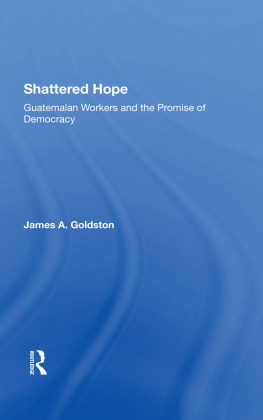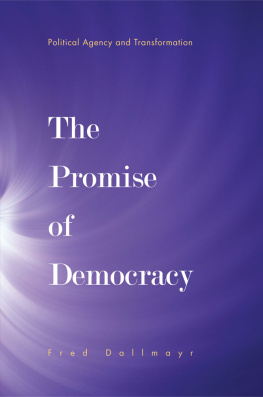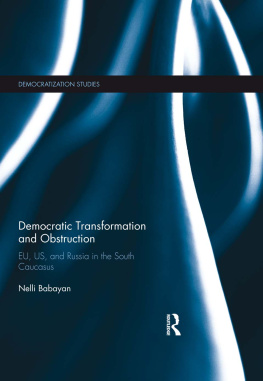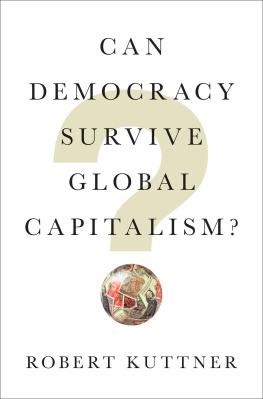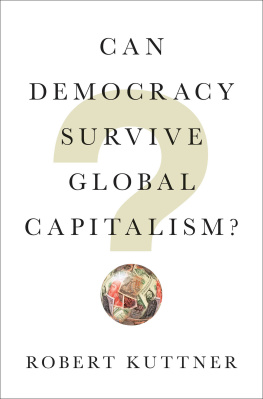First published 1989 by Westview Press
Published 2019 by Routledge
52 Vanderbilt Avenue, New York, NY 10017
2 Park Square, Milton Park, Abingdon, Oxon OX14 4RN
Routledge is an imprint of the Taylor & Francis Group, an informa business
Copyright 1989 Taylor & Francis
All rights reserved. No part of this book may be reprinted or reproduced or utilised in any form or by any electronic, mechanical, or other means, now known or hereafter invented, including photocopying and recording, or in any information storage or retrieval system, without permission in writing from the publishers.
Notice:
Product or corporate names may be trademarks or registered trademarks, and are used only for identification and explanation without intent to infringe.
Goldston, James.
Shattered hope: Guatemalan workers and the promise of democracy/
by James A. Goldston.
p. cm.(Westview special studies on Latin America and the
Caribbean)
Includes index.
1. Working classGuatemalaPolitical Activity. 2. Human rights
Guatemala. 3. GuatemalaPolitics and government1985
I. Title. II. Series.
HD8146.5.G651989
322.2097281dc20
89-32796
CIP
ISBN 13: 978-0-367-28721-4 (hbk)
To the people of Central America, who have given me so much
Labor laws and rights are essential to the promotion of social justice and to the safeguarding of human freedoms in any society. On this principle, the Universal Declaration of Human Rights, adopted in 1948, specifically affirms for every person the right to a job; the right to form and join trade unions; and the right to an adequate standard of living.
Yet, the lack of an explicit endorsement of fundamental labor rights in the U.S. policy towards the rest of the world, until recently, has contributed to the serious deterioration of respect for labor rights and to the decline of labor conditions both in the United States and abroad. Sadly, internationally recognized worker rights (i.e., freedom of association; the right to organize and bargain collectively; the prohibition of forced labor; the establishment of a minimum age for the employment of children; and acceptable conditions of work with respect to minimum wages, hours of work, and occupational safety and health) are systematically and brutally denied to millions of workers in many foreign countries.
During the past five years, strong voices in the Congress and in the human rights, religious, labor, business, and international development communities have stood up to the deteriorating conditions besetting working people in developing and developed countries alike. We recognize that an open trading system and real, sustainable growth in the global economy can only be attained if workers are given as much of a stake in them as consumers, corporate managers, and financiers. Accordingly, since 1983, five laws have already been enacted in the United States that link respect for internationally recognized worker rights to the conduct of U.S. trade and investment policies.
The initiative now rests substantially with unions, human rights activists, church groups, advocates of broad-based international development, enlightened business leaders, agricultural experts, knowledgeable academics, past and current government officials, and concerned individuals to broaden the scope of our work to become watchdogs for the basic rights of working people in America and throughout the world. The challenge is before us to maximize the potential of the recently enacted labor rights laws in the U.S. and to build public understanding of the need for additional U.S. laws and international action. Toward these ends, the International Labor Rights and Education Fund (the Fund) was incorporated in November 1986, as a new, tax-exempt, non-profit organization that is dedicated to promoting international respect for basic labor rights. Its president is Ray Marshall, former Secretary of Labor in the Carter Administration.
The Fund is very concerned that U.S. policy-makers, the media, and the American people suffer from a lack of first-hand, factual information on the legal status and effective exercise of internationally recognized worker rights in foreign countries. To rectify this situation, the Board of Directors of the International Labor Rights Education and Research Fund has decided to sponsor field investigations and to publish an on-going series of studies of labor laws and practices in selected countries.
This is the first such country study supported by the Fund. In it, James Goldston provides a very thorough and disturbing report on labor rights and conditions in Guatemala. Please share your thoughts and reactions with us in order that the Fund can more completely fulfill its purposes in the future.
Bill Goold
Executive Director
International Labor Rights
Research and Education Fund
The fieldwork upon which this report is principally based was conducted in March, April and May 1988. Notwithstanding efforts to situate the present transitional stage of Guatemalan history in a broader context, this study necessarily captures a moment in time. Unless otherwise indicated, descriptions of events herein refer to the period ending in the late spring 1988.
The brief discussion which follows indicates the extent to which recent months have only confirmed the disturbing tendencies identified in the substance of this report: weakened civilian authority, strict limits on the political space which unions and other popular organizations are permitted to occupy, and persistent resort to violence against workers and peasants who demand the economic foundation for a humane existence.
In the latter half of 1988, the human rights situation in Guatemala continued along a path of marked deterioration. President Cerezo is nearing the end of his third year in office, but his ability to hold the Armed Forces to account for its actions has been all but destroyed in the wake of repeated coup attempts. Accordingly, abuses are on the rise, particularly in the labor sector.
The New York Times reported in November that politically motivated kidnappings, disappearances and murders of labor leaders, union organizers and leftists have increased almost every month since May 1988. In a recent report, Americas Watch said that from January 1 through September 30, 1988, at least 621 persons died in politically related assassinations, most at the hands of government military and security forces.
Organized workers and peasants have continued to experience threats and intimidation. In June 1988, Victor Hugo Perez Saso, a member of the electrical workers union STINDE and Vice President of the Workers Association of El Peten, was visited at his home by
During the same month, armed unidentified men stopped STINDE member Isidro Manfredo Mazariego Calderon as he traveled by bus in Guatemala City and made threats regarding his union activities. The men reportedly told Mazariego that they knew where he lived and had information about members of his family.
Compulsory service in civil patrols has proceeded apace. The Washington Office on Latin America reported in September that patrol members in northern Huehuetenango province had been ordered to construct punishment cells for those who missed patrol duty. On August 17, 1988, a group from the Quiche province, the Runujel Junam Council of Ethnic Communities (CERJ), marched in Guatemala City to protest the fact that minors were among those being forced to patrol. According to the CERJ, persons who fail to report for patrol duty are threatened with death or disappearance of themselves and/or family members, and are accused of being subversives.

